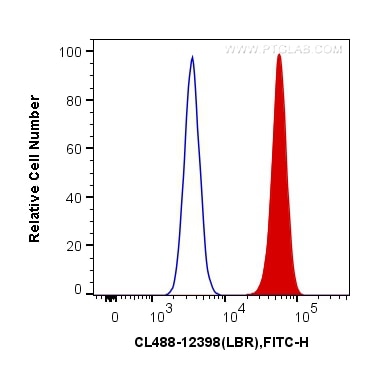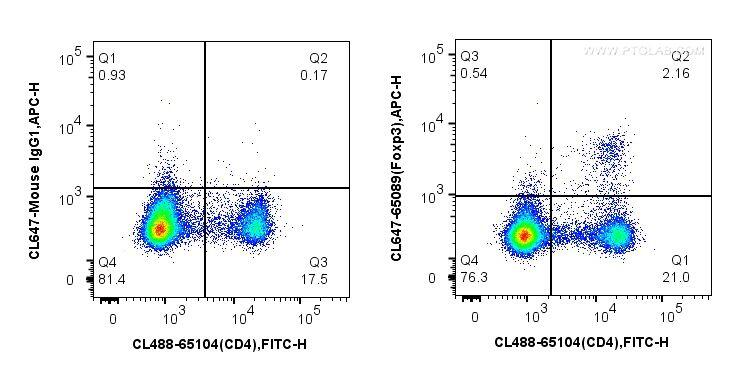Anticorps Polyclonal de lapin anti-LBR
LBR Polyclonal Antibody for FC (Intra)
Hôte / Isotype
Lapin / IgG
Réactivité testée
Humain, rat, souris
Applications
FC (Intra)
Conjugaison
CoraLite® Plus 488 Fluorescent Dye
N° de cat : CL488-12398
Synonymes
Galerie de données de validation
Applications testées
| Résultats positifs en cytométrie | cellules HeLa |
Dilution recommandée
| Application | Dilution |
|---|---|
| Flow Cytometry (FC) | FC : 0.40 ug per 10^6 cells in a 100 µl suspension |
| It is recommended that this reagent should be titrated in each testing system to obtain optimal results. | |
| Sample-dependent, check data in validation data gallery | |
Informations sur le produit
CL488-12398 cible LBR dans les applications de FC (Intra) et montre une réactivité avec des échantillons Humain, rat, souris
| Réactivité | Humain, rat, souris |
| Hôte / Isotype | Lapin / IgG |
| Clonalité | Polyclonal |
| Type | Anticorps |
| Immunogène | LBR Protéine recombinante Ag3088 |
| Nom complet | lamin B receptor |
| Masse moléculaire calculée | 615 aa, 71 kDa |
| Poids moléculaire observé | 58 kDa |
| Numéro d’acquisition GenBank | BC020079 |
| Symbole du gène | LBR |
| Identification du gène (NCBI) | 3930 |
| Conjugaison | CoraLite® Plus 488 Fluorescent Dye |
| Excitation/Emission maxima wavelengths | 493 nm / 522 nm |
| Forme | Liquide |
| Méthode de purification | Purification par affinité contre l'antigène |
| Tampon de stockage | PBS avec glycérol à 50 %, Proclin300 à 0,05 % et BSA à 0,5 %, pH 7,3. |
| Conditions de stockage | Stocker à -20 °C. Éviter toute exposition à la lumière. Stable pendant un an après l'expédition. L'aliquotage n'est pas nécessaire pour le stockage à -20oC Les 20ul contiennent 0,1% de BSA. |
Informations générales
Lamin-B receptor (LBR) is an integral membrane protein of the inner nuclear membrane that contains a hydrophilic N-terminal end protruding into the nucleoplasm, eight hydrophobic segments that span the membrane and a short, nucleoplasmic C-terminal tail (PMID: 28858257). LBR anchors the lamina and the heterochromatin to the inner nuclear membrane (PMID: 10828963; 28858257). It is also essential for cholesterol synthesis (PMID: 27336722). Mutations of the LBR gene have been associated with autosomal recessive HEM/Greenberg skeletal dysplasia and Pelger-Huët anomaly and Greenberg skeletal dysplasia (PMID: 12618959; 12490533). The calculated molecular mass of LBR is 71 kDa, which is larger than the apparent molecular mass of 58 kDa, probably due to the aberrant migration of membrane proteins subjected to SDS-PAGE (PMID: 2847165; 2170422).
Protocole
| Product Specific Protocols | |
|---|---|
| FC protocol for CL Plus 488 LBR antibody CL488-12398 | Download protocol |
| Standard Protocols | |
|---|---|
| Click here to view our Standard Protocols |



